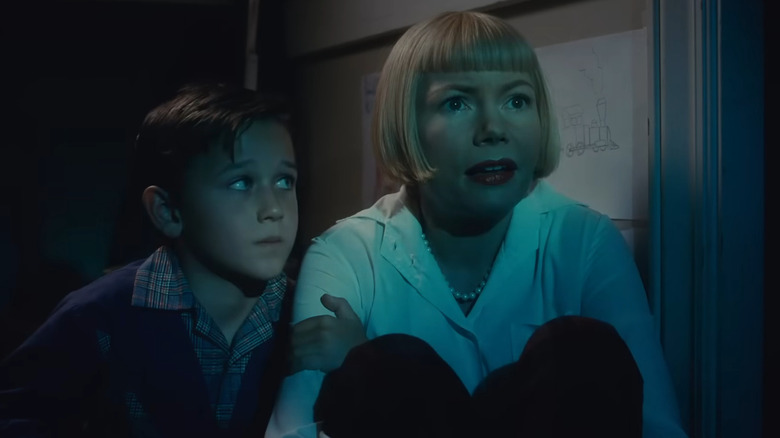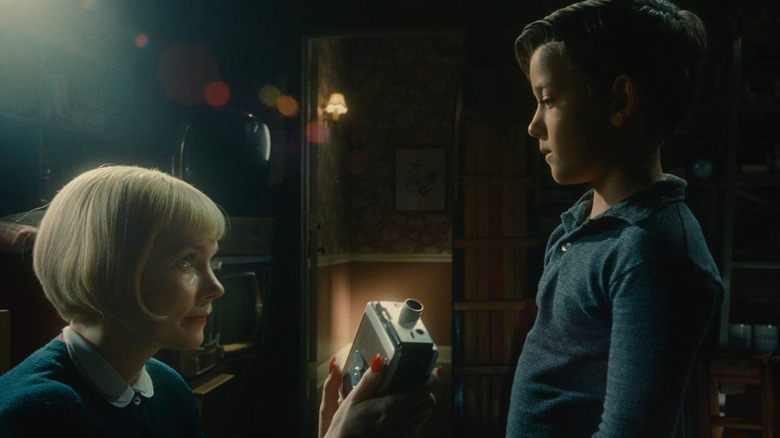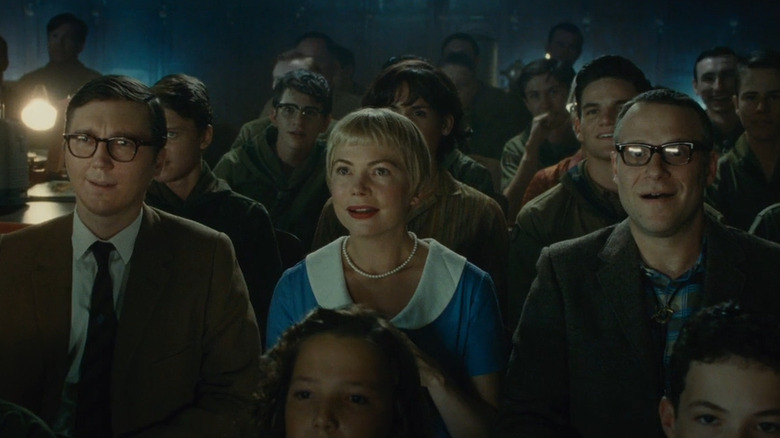A Few White Lies From His Mother Helped Foster Steven Spielberg's Filmmaking Talents
It must have been wild for Steven Spielberg to go from making home movies with his best friends to becoming one of the biggest names the industry has ever seen. So much of how movies are made, especially in the realm of blockbusters, can be attributed to his work, most notably on a little shark picture ("Jaws") that has traumatized folks to stay out of the water for generations. He could easily boast about his Academy Awards and box office records, but at heart, he's still the imaginative young kid who loved to make movies with whatever he could get his hands on.
Spielberg remembers where he came from, which makes a project like "The Fabelmans" feel extra special. It takes a lot to mine a swath of memories from your formative years for the world to see, but that's exactly what he does here — and in top form too. The film may be a fictional retooling of Spielberg's childhood, but the anecdotes within, such as his family's pet monkey or young Spielberg's meeting with legendary filmmaker John Ford (David Lynch), are pulled directly from his life experiences.
In "The Fabelmans," Sammy (Gabriel LaBelle) develops a fascination with the art of motion pictures after seeing a train crash in Cecil B. DeMille's "The Greatest Show on Earth." But in the midst of discovering his love for the form, his family life becomes inevitably intertwined with the emotion of his cinematic language. The divorce of Arnold Spielberg and Leah Adler initially caused some friction within the family dynamic. At the heart of their relationship, however, was a support system for young Spielberg's ambitions, especially from Adler.
Playing hooky with Mom
Adler was an artist herself, having studied at Cincinatti's Conservatory of Music, which put her on the path to becoming a concert pianist. During a 1992 interview with "60 Minutes," Adler said she didn't know her son would become the filmmaking giant he was today, but as an artist herself, she still recognized his imagination just aching to burst out. Sometimes Adler would feel so in tune with young Spielberg's drive to make movies, that she would happily forge sick notes for him:
"He wanted to do something hair-brained like go out in the desert and make a movie ... I drove an Army Jeep. We lived in Arizona, and I had a Pith helmet, and a fatigue outfit, and he'd say let's go, and I'd keep him home from school. I used to lie. I wrote marvelous notes. I'm very creative. I could always think up a new ailment to keep my kid home from school."
In "The Fabelmans," she's embodied by Mitzi (Michelle Williams), a flawed maternal figure who, on the surface, appears to have the perfect life. Much like Adler, she's a generous free spirit who constantly sees the beauty of the world around her. But akin to Sammy's love for filmmaking, she's harboring a collection of complicated emotions that quietly haunts her. In the film's most heartbreaking scene, the artistic bond between mother and son comes to a head as a revelation is captured by the objectivity of the camera she encouraged him to explore with.
Every clip I've seen of Adler goes to show how much Michelle Williams nailed her performance. As a tribute, "The Fabelmans" speaks for itself, but you don't have to look too far to see how much of an impact Adler had on him.
Adler was Spielberg's 'lucky charm'
In 1994, Spielberg finally won his first Academy Award for Best Director with "Schindler's List," having been nominated previously for "Close Encounters of the Third Kind" and "Raiders of the Lost Ark." Nearly two decades after his first feature film ("Duel"), the filmmaking titan was finally about to be recognized by his peers. But most importantly, he was about to face his greatest cheerleaders, as both Adler and Arnold were present in the audience.
During his acceptance speech, in a perfectly timed moment straight out of the movies, Spielberg turns his attention to his mother with the biggest smile on his face, and calls her his "lucky charm." Much like any proud parent, she looks at him with so much affection. It's beautiful whenever someone at the Oscars pays their dues to the people that got them there, but "The Fabelmans" gives this point in history an even greater emotional impact. In that moment, something as simple as a sick note here and there means everything.
Adler sadly passed away in 2017, but depending on how things play out, she may be returning to the Oscars in the spirit of Williams' magnificent performance.
"The Fabelmans" is now playing in theaters, in addition to streaming for rental/purchase on most VOD platforms.


